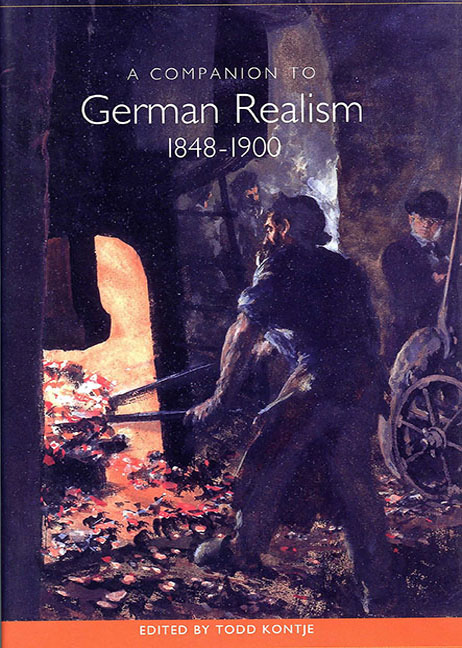Book contents
- Frontmatter
- Contents
- Preface
- Introduction: Reawakening German Realism
- Adalbert Stifter's Brigitta, or the Lesson of Realism
- Mühlbach, Ranke, and the Truth of Historical Fiction
- “In the Heart of the Heart of the Country”: Regional Histories as National History in Gustav Freytag's Die Ahnen (1872–80)
- A Woman's Post: Gender and Nation in Historical Fiction by Louise von François
- Friedrich Spielhagen: The Demon of Theory and the Decline of Reputation
- Wilhelm Raabe and the German Colonial Experience
- From National Task to Individual Pursuit: The Poetics of Work in Freytag, Stifter, and Raabe
- Das Republikanische, das Demokratische, das Pantheistische: Jewish Identity in Berthold Auerbach's Novels
- E. Marlitt: Narratives of Virtuous Desire
- The Appeal of Karl May in the Wilhelmine Empire: Emigration, Modernization, and the Need for Heroes
- Making Way for the Third Sex: Liberal and Antiliberal Impulses in Mann's Portrayal of Male-Male Desire in His Early Short Fiction
- Effi Briest and the End of Realism
- Works Cited
- Notes on the Contributors
- Index
Mühlbach, Ranke, and the Truth of Historical Fiction
Published online by Cambridge University Press: 27 April 2017
- Frontmatter
- Contents
- Preface
- Introduction: Reawakening German Realism
- Adalbert Stifter's Brigitta, or the Lesson of Realism
- Mühlbach, Ranke, and the Truth of Historical Fiction
- “In the Heart of the Heart of the Country”: Regional Histories as National History in Gustav Freytag's Die Ahnen (1872–80)
- A Woman's Post: Gender and Nation in Historical Fiction by Louise von François
- Friedrich Spielhagen: The Demon of Theory and the Decline of Reputation
- Wilhelm Raabe and the German Colonial Experience
- From National Task to Individual Pursuit: The Poetics of Work in Freytag, Stifter, and Raabe
- Das Republikanische, das Demokratische, das Pantheistische: Jewish Identity in Berthold Auerbach's Novels
- E. Marlitt: Narratives of Virtuous Desire
- The Appeal of Karl May in the Wilhelmine Empire: Emigration, Modernization, and the Need for Heroes
- Making Way for the Third Sex: Liberal and Antiliberal Impulses in Mann's Portrayal of Male-Male Desire in His Early Short Fiction
- Effi Briest and the End of Realism
- Works Cited
- Notes on the Contributors
- Index
Summary
The line between fact and fancy runs straight and uninterrupted until it hits historical fiction; at least, the boundary seems clear before it bumps into this curious mixture of history and fiction that seems simultaneously true and false. Historians find their truth in archives. They ransack bits of parchment, paper, and film; assess discarded objects; and analyze the traces our ancestors left on the landscape. Then they stitch the results together in a story or an interpretation of people's actions in the past. Except for those rare instances when historians wonder about how to put their truth on the page, the reading, viewing, and listening public accepts history as a true representation of the past. Novelists, on the other hand, invent. They search for poetic truth, often in the form of generalizations about human nature, but they make no claim on the facts. While authors may research locations, crib material from their friends, family, and, most important, their own experiences, their ultimate arbiter lies elsewhere, beyond fact-checkers and footnote sleuths. Novelists’ truths take shape in their heads. “Fictional truth,” to use Michael Riffaterre's term, functions at the level of coherence and plausibility; it resists both verification and falsification. Again, the border seems clearly demarcated until it reaches historical fiction, and it was during the nineteenth century in Germany, when and where history arose as an academic discipline and historical fiction became the most widely read genre of literature, that historians and historical novelists attempted to divide the past, that is, to draw the line between history and fiction. This essay chronicles that division of labor and territory in paradigmatic fashion by examining works by two of the most prominent participants: the historian Leopold von Ranke (1795–1886) and Luise Mühlbach (1814–73), a prolific author of historical fiction.
Treating the past as fact or fancy acquired a particular relevance in nineteenth-century Germany, because the rise of these two modes of dealing with history coincided with the arrival of nationalism as a political and cultural force throughout Europe, and national identities presumed a shared past. At least, they rested as much on the assumption of a common history as on commonalties of religion, race, language, or culture.
- Type
- Chapter
- Information
- A Companion to German Realism 1848-1900 , pp. 53 - 84Publisher: Boydell & BrewerPrint publication year: 2002

